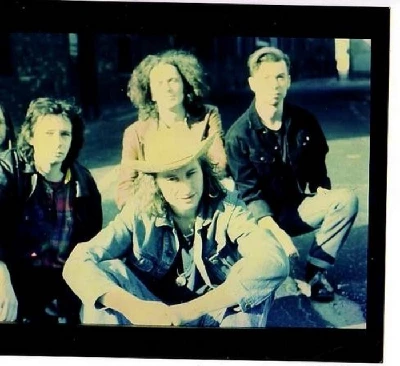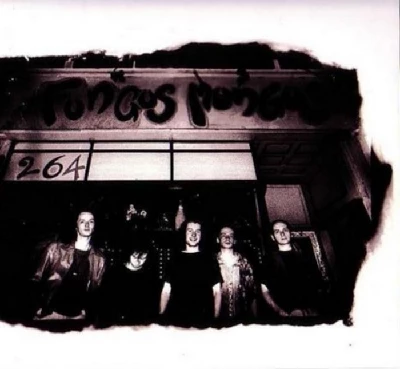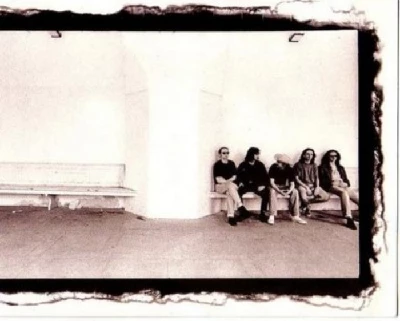published: 24 /
11 /
2008

PB : A lot of your songs such as ‘Looking through the Butcher’s Window’, ‘Heather’ and ‘God’ were obviously all highly autobiographical. Did all your songs have an element of the truth about them ?
Article
PB : A lot of your songs such as ‘Looking through the Butcher’s Window’, ‘Heather’ and ‘God’ were obviously all highly autobiographical. Did all your songs have an element of the truth about them ?
GG : Anything that wasn’t a co-write was largely autobiographical. On some of the co-writes that I did with Mike, things like ‘Coffee and Hope’ and ‘Trashscene’, we used William Burroughs cut-ups, just pulled out any old thing that we thought was interesting. For me trying to tap into something that is actually there is the really exciting thing with lyric writing. The majority of the songs were all pretty autobiographical.
PB : The meaning of ‘You Can’t Win Them All Mum’ has been the subject of a lot of debate amongst your fans . What was that song actually about ?
GG : (Laughs). I wrote that quite a bit before even the Lost Soul Band. I wrote that when I was I think about nineteen. The whole path I was taking at that time was something that my parents didn’t really approve of. I wanted to go really alternative and was trying to tap into the angst that I was feeling at the same time. In a different way I suppose that it was the sort of thing that you got from Morrissey and the Smiths as well. It is a real outsider bed sit number.
PB : You said that you were dropped just as that single went into the charts. Why were you dropped ?
GG : The label was actually quite happy with us (Laughs). Silvertone was owned by Zomba Music, who were publishers for the likes of Springsteen and Tina Turner. We were meant to be on a development deal, the idea being to give us a few records to develop ourselves, something like REM with Warners. Everything was fine, but the guy who owned the whole company and who was an American was doing this kind of audit. He was going in person around a lot of his main offices, looking at how things were going. Maybe he wasn’t happy with the general state of things, but from what I was told by our manager it came out of the blue. He had come into the office, looked at the acts on the roster , where we were on the graph at that moment and just said, "What the fuck have you got these guys here for ?"
There wasn't a general feeling that it wasn’t coming together or anything like that, but I am quite a gut person and, to be honest, I kind of felt that it wasn’t going the right way. You get a feeling sometimes that you’ve missed the boat and it was like that with us.
Labels might sign ten or twenty bands, but they will be lucky if one of them makes a dent. You have to have a real vibe going on for a band if it is going to make it and for us, after that initial good start in Scotland, it just seemed a lot of the time for us to make ground it was like getting blood out of a stone. It didn't really feel like the machinery was behind us.
PB : Do you think that part of the problem was that in many ways you were a band out of time ? . What were you doing just didn’t sound like anybody else ?
GG : Yeah. That has become clearer to me now. We weren't part of any scene. I have always been bloody-minded about things. At the time though I didn’t really think that it would matter, but of course it does. The record industry has got its own kind of rules.
PB : You picked up good press in Scottish based papers like ‘The Scotsman’ and ‘TLN’, but you didn’t get much publicity in the likes of the ‘NME’ and ‘Melody Maker’. There was also no internet at the time. Dy you think the internet might have helped ?
GG : Young bands with a hectic energy and who have a live excitement tend to work well and build up audiences through the internet. If the Lost Soul Band had been around now, I think we would have done quite well. We weren't seen ever as being hip or credible enough to attract the interest of the small bunch of people that might write about you, whereas Lucky Jim in contrast, while never such a major live thing, were always right from the start seen as being hip and credible.
PB : Both Michael and Brian Hall left early 1994. Why did they leave ?
GG : It all got pretty acrimonious at that point. Brian and Mike were always the more reserved, sensible ones in the band, whereas the other guys and I were the imps (Laughs). For me making music was always a passion. That is why I still do it now. Brian was a bit older and he had a girlfriend who lived in Germany. He was looking over the accounts regularly with our manager and an accountant and he told me recently it was really depressing at that time looking at what we had to spend and how little we were making. That caused a rift and an atmosphere between us and Gavin, Richard and I decided to go it on our own.
PB : Who released the final album, 'Hung Like Jesus' ?
GG : It was self-released on our own label, 69 Records. Nobody else wanted to touch it. That was another eye opener for me. Once you are off a label perception of you just completely changes.
PB : A lot of that album shows a real degree of cynicism and disgust with the record industry. It is also in many ways a drugs album. What kind of emotional state were you in at the time of that album ?
GG : Things were absolutely fucking mad. I wasn’t doing anything hardcore. I was just smoking a lot of pot and drinking a hell of a lot. In a way I was being as creative as I had ever been. In fact I wrote most of that record simultaneously at the same time that I wrote ‘Friday the 13th’. If you look back to notebooks I had from the period, the songs were intermingled.
PB : That is really surprising because the songs are completely different. Both ‘Friday the 13th’ and ‘The Land of Do As You Please’ have got this real sense of wonder to them and excitement with the world. That had long gone by the time of ‘Hung Like Jesus’.
GG : I don't think that it as strong an album as ‘Friday the 13th’. We tried to do this big leap into something new with that album. I had blitzed the Gram Parsons/Neil Young thing with ‘Friday the 13th’ and I wanted to go in a kind of Pixies/Jimi Hendrix direction. I was also listening to a lot of Pavement at the time. That is not really the way it turned out though because at that point it was just down to the three of us and that whole album was pretty much recorded on a shoestring. Something like ‘H’ from ‘Friday the 13th’ was, however, written pretty much in a week of '69' from 'Hung Like Jesus'.
PB : How long after ‘Hung Like Jesus’ did you break up ?
GG : We kept going as a three piece for almost a year. We did a lot of gigging. It became a bit like a military exercise by then. We started picking up these gigs that were completely off the radar. We were going to places like Alloa and were able to play pretty busy gigs there. It actually became easier picking them up out of town than it was in Glasgow or Edinburgh.
Richard's wife became pregnant with his first child and he was trying to put this brave face on things, but I think he was thinking, " I am skint. I can’t do this rock ‘n’ roll thing anymore." Eventually at some point I just went, "Fuck it. I think we have hit the end of the road", and we split up. That must have been in late '94.
PB : You spent some time after living in Amsterdam and Paris and New York before ending up in Brighton where you formed Lucky Jim initally with Ben Townsend. How did you end up in Brighton ?
GG : Once the band split up, I didn't really understand it at the time or know what it was, but I ended up going into a serious depression. While I was in what seemed like an endless brown tunnel my girlfriend and I decided to go abroad.
We went to Amsterdam and I busked the whole time there for a living. We were there for six months and then we went to Paris for about a year. We then lived in Andalucia for about six months and then once we came back my girlfriend got pregnant and we had my first son. I could see that the roots were going down and I had to decide where we were going to land. We had this chance to go to Glasgow and went there. It was the wrong move in the long term. It was a totally unpleasant experience having a new born, being totally skint and signing on the south side of Glasgow.
It is a long story but I did this kind of do or die thing and we moved back to my folks for what I hoped would be as short a time as possible with our kid. I couldn't accept where I was at or the way things were shaping up. I wasn’t getting any musical respect, which I had really started to want again and so I completely and utterly selfishly went off to New York in late 2000.
I got this total compulsion to go. There was no particular reason for me going, although I did end up busking out there and playing some of the folk clubs. I used money that we didn’t have and for three months left my partner and my kid. While I was there I met this English journalist. I was talking to him in a bar one night, and telling him how I didn’t want to live in Edinburgh or Glasgow anymore and while I would love to be there in New York I didn’t have the means to move there permanently. And he went to me just totally out of the blue, "You should try Brighton." I asked him some more about it and then I phoned my girlfriend and told him that we were going to move to Brighton.
It was probably one of the better decisions I made because I met Ben right away and got a record deal really quickly. That was after a gap of about ten years between deals.
PB : You’re now based in London. Is it just you in Lucky Jim now ?
GG : I moved to London not that long into the Lucky Jim thing. I did three records with Ben, but we have gone our different ways now. I use a lot of the musicians from Turin Brakes when I need them. I am just finishing an album that I can tour with them and I have got some stuff coming up next year in Europe
PB : How did the decision to get the Lost Soul Band back together for these last two gigs come about?
GG : It has really come out of the blue. It is Gavin who has got us back together. He plays in a pub band in Glasgow and he had got a new girlfriend. He was around at her house and looking through her records and she had a Lost Soul Band record. It was just a total coincidence and he went, “Oh. That used to be me” (Laughs). He decided he wanted to do something after and then he got in touch with everyone.
I had made the rounds with all of the group since we broke up. I was playing in Germany and I hooked up with Brian who now lives there and we get along great now. I have been in touch with Mike since then as well and everything is cushtie between us these days.
The only person I wasn’t sure about was Richard. Richard literally sold his bass the moment we split up and never played again. He went into a regular job, so I thought it might be too much of a head fuck for him (Laughs). He did say that he found the concept of playing live beyond abstract (Laughs), but has bought a bass and been practicing. He is completely up for it.
PB : How do you feel about the three Lost Soul Band albums now ? How do you personally rate them now ?
GG : I would probably give ‘The Land of Do As You Please’ six out of ten . It has got its moments, but it is a bit all over the place musically and could have been more consistent. I would give ‘Friday the 13th and eight and a half. I think it is the best of our albums. ‘Hung Like Jesus’ is a funny album to me because , while it had some of the members on it, it never seemed like it was a Lost Soul Band album. I do know, however, people who don’t really care for the two other albums but who are absolutely obsessed with that one.
I think a lot of the Lost Soul Band’s songs really stand up on their own. It doesn’t matter how something like ‘You Can’t Win Them All Mum was recorded or whichever take we used. I think it is probably one of the most original things that I have ever done. It is not a love song and it is not political, but there is this total passion to it. People relate to it, especially maybe 16 to 20 year olds not sure what they are doing with their life (Laughs), but in lots of different ways. I think that I nailed something with that.
PB : Thank you.
Picture Gallery:-

